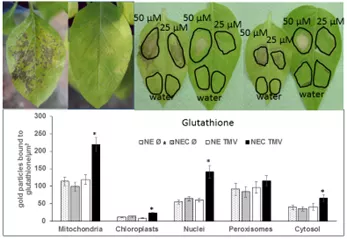Scientists at the Plant Protection Institute of the HUN-REN Centre for Agricultural Research (HUN-REN CAR) have characterized a novel aspect of biochemical processes governing plant virus resistance. They have demonstrated that enhanced resistance of a tobacco hybrid (Nicotiana edwardsonii ‘Columbia’) to Tobacco mosaic virus requires not only a plant hormone, salicylic acid but, following virus infection, the accumulation of a small antioxidant molecule, glutathione, also contributes to this antiviral response. The results were published recently in the prestigious scientific journal Molecular Plant-Microbe Interactions.
It was further shown that the enhanced resistance of N. edwardsonii ‘Columbia’ plants is effective against bacterial infections and herbicide stress. These research results were achieved in the framework of an international cooperation with the University of Szeged, Hungary and a US and Egyptian research group.

A tobacco interspecific hybrid (Nicotiana edwardsonii ‘Columbia’) displays enhanced resistance to the infection of Tobacco mosaic virus (TMV) (two pictures at upper left) and tissue necrosis caused by the herbicide paraquat (25 and 50 µM) (two pictures at upper right). One possible cause of enhanced stress resistance of the ‘Columbia’ hybrid is the subcellular accumulation of a small antioxidant molecule, glutathione, detectable in several different organelles (see graph).